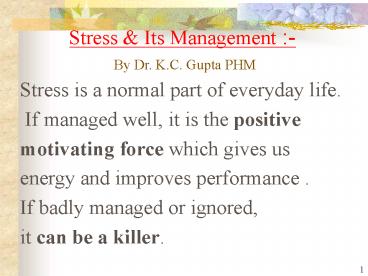Stress - PowerPoint PPT Presentation
1 / 15
Title:
Stress
Description:
Doing Regular exercise. Developing hobbies and interests. Relaxing and having adequate sleep ... Regular Exercise (Movements of all body parts with focussed attention) ... – PowerPoint PPT presentation
Number of Views:29
Avg rating:3.0/5.0
Title: Stress
1
Stress Its Management - By Dr.
K.C. Gupta PHM Stress is a normal part of
everyday life. If managed well, it is the
positive motivating force which gives us energy
and improves performance . If badly managed or
ignored, it can be a killer.
2
Stress is defined as the feeling of tension which
can be both physical and emotional. Physical
stress refers to physiological reaction of the
body to various triggers. Emotional stress
occurs when situations are considered difficult
unmanageable,or when demands/needs exceed the
resources.
3
- Various Definitions of Stress
- Stress is a dynamic reaction in which a person
is confronted with an opportunity ,constraint ,
or demand related to his /her desire for which
the outcome is perceived to be both certain
important. - Stress is a function of our perception , attitude
and interpretation we give to situations /events
in our life. - Stress is a condition characterized by emotional
strain and /or physical discomfort which if
goes unrelieved can impair ones ability to
cope with - the environment .
4
- Personal Stress - Life events
- - Time Constraint
- - Ambitions
- - Overwork
- - Attitude
- Professional Stress-
- - Job dissatisfaction
- - Work environment
- - Conflicts
- - Work pressure
- - Targets/deadlines
- -Lack of Authority
5
Individual (Ambitions/Desires/ Demands )
Politics (Political Environment )
Environmental (Noise Pollution )
STRESS
Parental (Lack of Values )
Family Problems /Demands
Organizational (Lack of authority/Responsibility
6
Positive Stress i.e. Eustress - Beneficial for
performance, productivity, mobilization of
resources, extra energy, higher motivation .
Negative Stress i.e. Distress - when
stress is beyond the coping ability , Harmful
for performance and health . (risk factor)
Low productivity,low motivation , poor
analytical ability, poor communication skills ,
poor self discipline, inferiority complex
etc. Health problems like hypertension,
obesity,diabetes mellitus, heart disease(CAD),
stroke, anxiety neurosis, peptic ulcer, mental
breakdown, depression etc.
7
- Sequence of events during the Stress
- Any Stressful event/threat/challenge
- Increased Stress Harmones (Adrenaline/Noradrenalin
e) - Sympathetic nervous system stimulation
- Palpitation,hyperventilation,sweating, panic
attack - Vasoconstriction-- effect on BP(high) blood
supply(reduced/cut off) to the target organs -- - Heart, Brain, Kidneys, eyes.
- Hypertension, Heart attack, Stroke,Blindness.
8
- If constant and continuous stress (chronic
stress) - Cortisol secretion from adrenals
- Depression of Immune system
- Lipid /Cholestrol levels- increased
- Blood Sugar levels-increased
- (cortisol leading to release of more glucose
from - liver and also insulin resistance)
- Chronic stress can lead to Hyperlipidemia
Diabetes.
9
Common Sources of Stress /Stressors Changes in
life , Disturbed relationship , Ill health ,
Surgery, Accidents, Pregnancy(first)
Separation and Divorce, Unemployment,
Failure in exam, Money Problem/Debt
, Excessive work pressure, Negative
thoughts, Conflicts, Competition, Fear, Anger
etc.
10
Manifestations of Stress - Physical ,Emotional ,
Behavioural Common Manifestations Headache,
Palpitation,Panic attacks, Anxiety,
Dizziness, Diarrhea, Irritability,
Insomnia, High B.P.,Muscle weakness, Hyperacidity
/ulcer, Memory loss, Excessive drinking and
smoking, Depression, Low motivation, Job
dis-satisfaction, Poor performance
11
Coping Skills to Cope With Stress Rational
Positive Thinking - Positive approach to life
events, Think rationally and logically, Have
self-confidence. Assertiveness - Skill to
communicate clearly and confidently,
expressing feelings or emotions freely, but not
to be aggressive as well as submissive or
passive . Time Management - Plan your Goals
Priorities, Delegate to subordinates, Dont
procrastinate, Keep a diary for To Do Works
daily.
12
Coping Skills - contd. Improving Relationship
Communication , love/passion ,commitment,
empathic listening . Looking After
Yourself(Self Care) Keep yourself healthy
and relaxed Physical exercise,Yoga,Meditation Re
laxation Techniques Healthy Sensible eating
Balanced diet with restricted fat and high
fiber, less coffee/cola. Develop hobbies and
interests . Take regular break.
13
- Changing The Causes
- Of Stress
- Removing the cause
- Adding resources
- Reorganizing life
- Avoiding stressors
- Developing The Skills
- To Cope
- Self development
- Time Management
- Assertiveness
- Communication
1
2
Managing Stress
4
3
- Working on your Mind
- Creating a positive image
- Changing unrealistic
- beliefs
- Avoiding negative thoughts
- A Balanced Lifestyle
- Taking Healthy diet
- Avoiding tobacco,alcohol
- and caffeine
- Doing Regular exercise
- Developing hobbies and interests
- Relaxing and having adequate sleep
14
- Ten Steps to Keep Stress Away -
- Regular Exercise (Movements of all body parts
with focussed attention). - Regular Breaks / Relaxation for 10mts. every two
hours . - Deep Breathing (40 times in a day ).
- Eating Sensibly moderately .
- Developing a good sense of humour .
- Smile (Smiling Gesture) .
- Listening with empathy.
- Protecting yourself from negative thoughts
/remarks. - Getting back into control( Control the way you
respond to others ). - Focus on your goals ( Planning Setting goals).
15
Thank you

